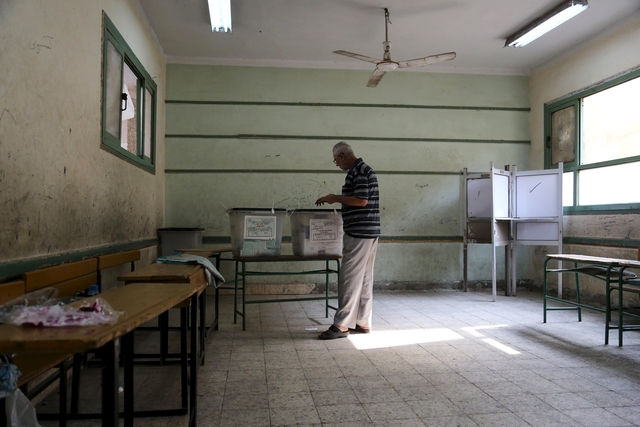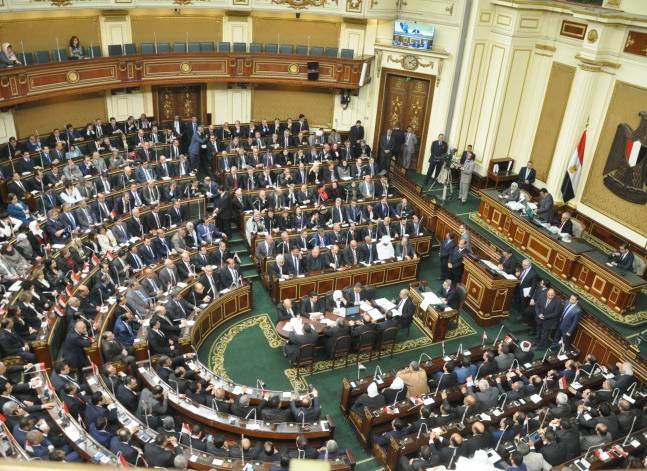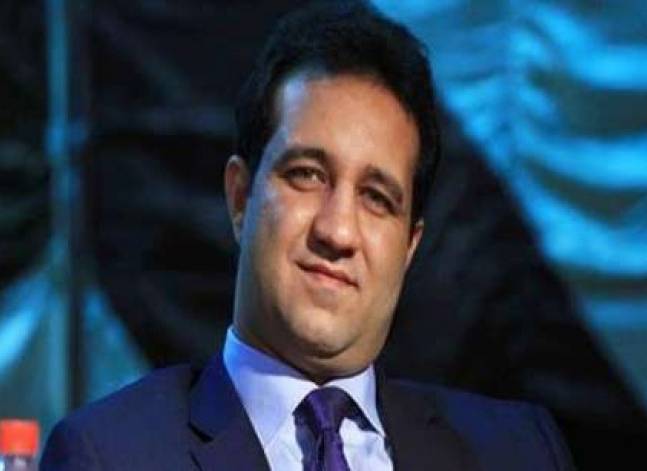Latest NEWS
- Aswat Masriya, the last word
- Roundup of Egypt's press headlines on March 15, 2017
- Roundup of Egypt's press headlines on March 14, 2017
- Former Egyptian President Hosni Mubarak to be released: lawyer
- Roundup of Egypt's press headlines on March 13, 2017
- Egypt's capital set to grow by half a million in 2017
- Egypt's wheat reserves to double with start of harvest -supply min
- Roundup of Egypt's press headlines on March 12, 2017
Parliamentarians hopeful, analysts say parliament's role equivalent to a 'rubber stamp'

Cairo Jan. 12 (Aswat Masriya) - Egypt’s third parliament in five years convened its first session on Sunday, after over three years of absence.
In the procedural meeting that inaugurated the unicameral parliament, parliamentarians took their oaths, voted for a parliamentary speaker, and even had a few arguments.
The House of Representatives’ kickoff was described in the Egyptian press headlines as “comic”, “tumultuous” and “a media show”, with controversial parliamentarian Mortada Mansour refusing to take the parliamentary oath on the grounds that its preamble had a sentence referencing the Jan. 25 uprising that toppled then-President Hosni Mubarak in 2011.
His son, Ahmed Mortada Mansour, is also a member of parliament on behalf of the Free Egyptians Party, which was founded by business tycoon Naguib Sawiris.
Mansour, the son, told Aswat Masriya he has high hopes for the new parliament. He believes that “there is a real opposition inside the parliament.”
“I will be the first to oppose (the government) for the purpose of constructive opposition and not be opposition for the sake of opposition,” he added.
Mahmoud Badr, another member of parliament and previously a co-founder of the Tamarod movement that organised protests calling for the overthrow of then-President Mohamed Mursi in 2013, stressed the importance of “the presence of a strong oppositional force inside the parliament” so that “it can light the way for the government” and pave the way for creating policies that are in the public interest.
Mursi, who hails from the Muslim Brotherhood group, was ousted by the military in July 2013 following mass protests against his rule.
The size and intensity of opposition in the parliament have been questioned by analysts, such as Dr. Ashraf El Sherif, a lecturer of political science at the American University in Cairo.
El Sherif said that opposition will be “non-existent” and the parliament will be marked by “parties that operate with this limit of not-clashing with the regime, which actually makes them not really an opposition,” or at best a “phony” one.
Weeks before the parliament was inaugurated, former military intelligence officer Sameh Seif Eyazal created the “Coalition to Support Egypt”, a parliamentary bloc that would “seek to curb the legislature’s wide-ranging powers” by forming a bloc to lead the House,” as he stated in a Reuters interview in October.
The bloc’s formation has sparked controversy and put the role of the parliament in the spotlight.
Medhat Elzahed, the head of the Socialist Popular Alliance Party, pointed out that “many current members of parliament had claimed earlier, when there was no parliament, that there was no need for a parliament and that we should just support the president."
El Sherif sees the parliament as “no more than a rubber stamp.” He expected its role to be more bureaucratic and administrative rather than political.
Another political analyst and commentator is less pessimistic: Abdallah al-Sinawy says it is too early to predict what role the parliament will play in the future.
He said that the first parliamentary meeting was “shocking”, citing Mortada Mansour’s refusal to swear the constitutional oath and noting that “he should have been kicked out.”
But, Sinawy adds, “It may get better”, because “there is no single likely scenario” in politics.
El Sherif casts doubt on the existence of vibrant politics in today's scene in the first place. He believes that the present regime promotes “hatred of politics,” so that “even patrimonial and authoritarian politics is not allowed…. there is not even a ruling party.”
“The parliament will be interesting in that it will showcase this question of the end of politics,” he said, adding that it will also be interesting to see how relationships will be administered in light of that.
“But the situation is complex,” he continued. “The parliament could expose the various disparities between different groups. Or in other words, it will bring up the question of “who will orchestrate the bargaining process in an environment where politics is not present.”
The socialist party’s head, Elzahed, said that early on, since the elections started, the process has been moving towards the creation of a parliament for “one voice.”
That voice is that of “the traditionalists and businessmen and it will marginalise other groups.”
This is the first time in 30 years for parliamentary elections to be held in the absence of the Muslim Brotherhood, which was designated a "terrorist organization" in December 2013 by virtue of a decision issued by the post-Mursi government.
According to El Sherif, the political scientist, Islamist groups such as the Brotherhood are out for the time being, but they may be back in the picture in the long term future.
Sinawy, however, thinks that this is the end for the Brotherhood, even if not necessarily for “political Islam”. The salafist Nour Party has a thin presence in the new parliament. One of the party’s prominent leaders, Yasser Borhami, was among a select number of religious and political figures who appeared with then-Defence Minister Abdel Fattah al-Sisi in the televised speech in which he publicly announced Mursi’s ouster in July 2013.
“There is no political future (for the Brotherhood),” Sinawy asserted. “Not because of the violence of the state, but because of (the Brotherhood’s) terrorism.”
In 2012, an Islamist-dominated parliament was elected but later that year, the military council that was ruling the country in the post-Mubarak transitional period ordered the dissolution of the parliament after the Supreme Constitutional Court deemed the election process unconstitutional.
Saad al-Katatni, a member of the Brotherhood and the previous speaker of the previous parliament, is now imprisoned, and has been sentenced to death on a list of charges, including “inciting the killing of protesters” and “insulting the judiciary.”
Since Mursi’s was ousted in 2013, scores of Muslim Brotherhood leaders and prominent figures have been arrested and brought to trial. Mursi himself was handed a death sentence which he can appeal.
The government insists the Brotherhood is behind the wave of militancy which has targeted security personnel since July 2013. The Brotherhood continuously denies the accusations.
Sunday's state-run newspapers called the 2016 House "the June 30 parliament" in reference to the protests that preceded Mursi's ouster.
In a joint statement issued Saturday, Egyptian human rights organisations, including the Cairo Institute for Human Rights and the Egyptian Initiative for Personal Rights, called on the parliament to reevaluate the decrees that have been issued since the ratification of the constitution in 2014.
During the absence of a parliament, the president held legislative powers, on condition that upon the election of a new parliament all the legislations passed by the president should be discussed and approved by the House within 15 days of its commencement, according to the constitution.
The human rights groups called on the parliament to respect human rights, social and economic rights, and children's rights.
“Everything depends on (this parliament’s) performance in the future,” Sinaiwy said.












